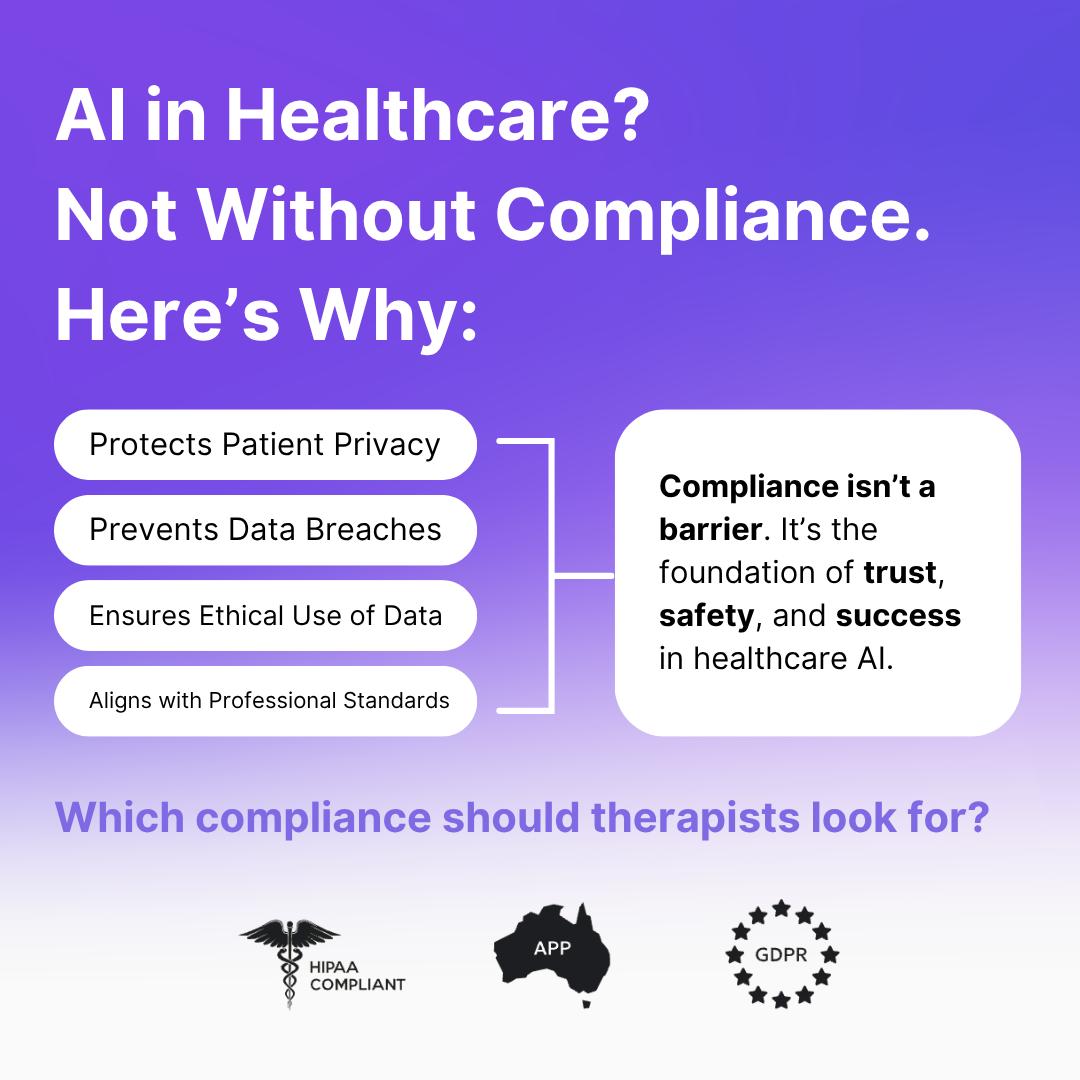- Published on
AI in Healthcare? Not Without Compliance. Here’s Why.
- Authors
- Name
- Bella Martini

Introduction
- 1. Protects Patient Privacy
- 2. Ensures Ethical Use of Data
- 3. Aligns with Professional Standards
- 4. Prevents Data Breaches
- So, Which Compliance Standards Should Therapists Look For?
- Compliance Is Not a Barrier; It’s a Foundation
The promise of AI in healthcare is enormous: faster documentation, smarter insights, and more time to focus on patient care. But before any of that can happen, one thing must come first - compliance.
For therapists and healthcare providers, compliance is not just another box to tick. It is the foundation that makes safe, ethical, and effective use of AI possible.
Here’s why compliance matters, and what to look for when choosing AI tools in healthcare.
1. Protects Patient Privacy
Healthcare professionals work with some of the most sensitive personal data there is. AI tools must be built with robust privacy measures that keep patient information secure. Compliance frameworks help ensure that data is handled lawfully and respectfully, and only accessed by those who need it.
2. Ensures Ethical Use of Data
Ethics in healthcare does not stop when AI starts. Compliance frameworks help ensure that AI is used in a way that respects client autonomy, minimises harm, and upholds the standards therapists are bound to. This includes everything from how data is stored to how algorithms are trained.
3. Aligns with Professional Standards
Therapists are guided by strict professional, legal, and clinical standards. The technology they use must support those same standards. Compliance ensures AI systems help you meet your duties around confidentiality, informed consent, and accurate documentation.
4. Prevents Data Breaches
No system is perfect, but compliant platforms are required to have safeguards in place. These include encryption, access controls, and breach notification protocols. This protects your clients, your practice, and your professional reputation.
So, Which Compliance Standards Should Therapists Look For?
When exploring AI tools for healthcare use, therapists should check for alignment with key regulations, including:
- GDPR (General Data Protection Regulation) – Applies to any service handling the personal data of UK and EU residents. It ensures transparency, consent, and the right to access and delete data.
- APP (Australian Privacy Principles) – If you’re practising in Australia, make sure your software complies with the APPs under the Privacy Act 1988.
- HIPAA (Health Insurance Portability and Accountability Act) – For therapists working with clients in the United States, HIPAA compliance is essential to protect health information.
- Professional Board Requirements – Always check with your regulatory body (such as HCPC, AHPRA, or others) for specific guidance on using technology and AI in your practice.
Compliance Is Not a Barrier; It’s a Foundation
It is easy to view compliance as red tape. In reality, it is what builds trust. Clients need to know their information is safe. Practitioners need to know their tools are ethical. And the healthcare system needs clear safeguards as it embraces new technologies.
AI can absolutely support healthcare, but only when it respects the responsibilities that come with working in this field.
Compliance makes that possible.
If you're interested in seeing how Everbility could support your practice, we’d love to show you what’s possible.
Click here to book a demo and we’ll walk you through it.